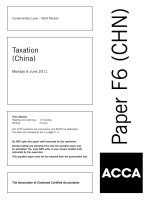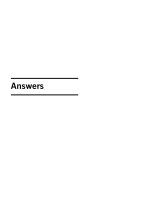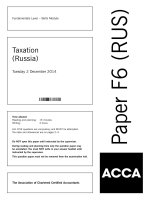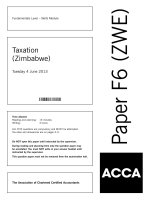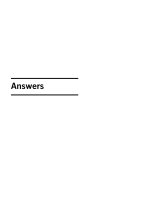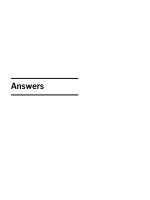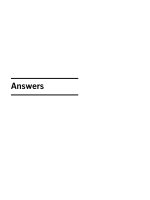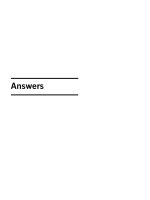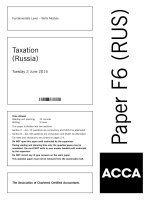ACCA f6 taxation zimbabwe 2014 jun answer
Bạn đang xem bản rút gọn của tài liệu. Xem và tải ngay bản đầy đủ của tài liệu tại đây (197.27 KB, 8 trang )
Answers
Fundamentals Level – Skills Module, Paper F6 (ZWE)
Taxation (Zimbabwe)
June 2014 Answers
and Marking Scheme
Marks
1
Nic Page
(a)
Tax obligations of Organo Products Limited (Organo)
Before payment of the consultancy services fees, Organo should request a valid income tax clearance
certificate from PCPL. In the absence of the tax clearance certificate, a deduction of 10% of the
consultancy fees should be made and remitted to ZIMRA within 10 days from the date of payment.
(b)
Tax registration obligations and submission of tax returns by Page Catering (Private) Limited (PCPL)
(i)
(ii)
Corporate tax:
PCPL should have registered for corporate tax with effect from the commencement of the business
operations on 5 June 2013 when the consultancy services agreement was signed with Organo. PCPL
should have submitted returns in line with the quarterly payment dates (QPDs) so the first return will
be due on 25 June 2013.
Employees tax (PAYE):
PCPL became an employer on 1 August 2013, and it is obliged to have registered for PAYE within
14 days from that date, hence latest date of registration is 15 August 2013. PAYE returns are due on
the 10th of the month following the tax period (month of PAYE deduction), so, the first return will be
due on 10 September 2013.
(iii) Value added tax (VAT):
The threshold for VAT registration is an annual sales revenue of US$60 000 or US$5 000 per month.
The catering services contract is for a monthly income of US$10 000, therefore PCPL should have
registered for VAT from the month of August 2013. The VAT returns should be submitted on the 25th
of the month following the end of the tax period.
(c)
2
–––
2
–––
2
–––
2
–––
NSSA contributions of PCPL as employer
US$
123
245
263
––––
631
––––
––––
Nic Page ($700 x 3·.5% x 5)
2 permanent employees ($700 x 3·5% x 2 x 5)
3 permanent employees ($500 x 3·5% x 3 x 5)
21
1
½
½
–––
2
–––
Marks
(d)
Taxable income and tax payable by/refundable to Nic Page for the year ended 31 December 2013
Total salary received (10 000 + 8 000)
Leave pay
School fees allowance
Housing allowance
Bonus (2 000 – 1 000)
Refund of benefit fund contributions (interest only)
Annuity (7 000 – (15 000/10))
Fuel allowance (30% x 15 000)
Loan benefit ((0·5% + 5% – 1%) x 15 000 x 10/12)
Motor vehicle deemed benefit (4 800 x 5/12)
Motor vehicle acquisition benefit (45 000 – 20 000)
Employee benefit fund contributions (non-registered scheme)
Pension contributions, RAF & NSSA (maximum amount)
Loan repayment (disallowed)
Home insurance policy contributions (disallowed)
Funeral insurance policy contributions (disallowed)
Total taxable income
Tax on sliding scale:
Up to US$60 000
(63 663 – 60 000) x 35%
15 600
1 282
–––––––
16 882
(1 500)
–––––––
15 382
461
–––––––
15 843
(26 100)
–––––––
10 257
–––––––
–––––––
Gross tax
Less: medical credit (3 000 x 50%)
Add: 3% AIDS levy
Less: PAYE (18 500 + 7 600)
Tax refundable
Refund of pension fund contributions:
Amount withdrawn
Less: transferred to CIPF scheme
92 500
(30 000)
–––––––
62 500
–––––––
–––––––
Taxable amount
Tax payable (62 500 x 35%)
Add: 3% AIDS levy
2
US$
18 000
2 000
5 000
2 500
1 000
3 000
5 500
4 500
563
2 000
25 000
0
(5 400)
0
0
0
–––––––
63 663
–––––––
–––––––
21 875
656
–––––––
22 531
–––––––
–––––––
½
½
½
½
1
1
1
½
1
1
½
½
1
½
½
½
½
½
½
½
1
½
½
–––
15
–––
25
–––
H&H Motor Spares (Private) Limited (H&H)
(a)
(i)
Commercial property owner – tax treatment of the lease agreement amounts
Lease premium:
The total lease premium of US$60 000 is included in gross income in the year of receipt.
Rent received:
The total rent received of US$33 000 is included in gross income in the year of receipt.
Capital allowances:
Capital allowances are claimable on the value of the improvements made by H&H as provided for in
the lease agreement, i.e. the warehouse and pavement. The annual allowance is therefore: (300 000
+ 50 000) x 2·5% = US$8 750
22
1
½
1½
–––
3
–––
Marks
(ii)
Action which should have been taken by H&H to minimise its tax liability
The specific requirement in the lease was for H&H to construct a warehouse at a total cost of not less
than U$300 000. H&H should have sought approval from the property owner for the price escalation
to US$350 000 well before the completion of the building. Price escalation approval should also have
been sought in the same way for the pavement.
Because H&H failed to do this, it can only claim a lease improvement allowance on the stipulated
amount of US$300 000 and not on the unapproved actual cost of US$350 000. Lease improvement
allowance for the pavement should also be claimed on the approved cost of US$50 000.
(b)
1
1
–––
2
–––
Taxable income and tax payable for the year ended 31 December 2013
Profit before tax
Add:
Repairs and maintenance
Fuel and licensing
Salaries and wages
Lease premium and warehouse rent
Donations – hospital
– social club
VAT late payment charge
Depreciation
Provision for directors’ fees
Protective clothing
Staff canteen provisions
Entertainment
Repairs and maintenance – leased properties
– unproductive property
Legal fees
New business licences
Renewal of business licences
Finance cost on overdraft facility
Finance cost on capital expenditure
Recoupment on sale of commercial vehicles
Less:
Rental income
Profit on sale of commercial vehicles
Leased premises rent (3 000 x 11)
Lease premium (60 000/10 x 11/12)
Lease improvements ((300 000 + 50 000)/10 x 6/12)
Capital allowances:
Commercial properties (2·5% x 300 000)
Furniture and equipment (25% x 150 000)
Commercial vehicles (25% x 180 000)
Taxable income
Corporate tax (including AIDS levy) at 25·75%
Less: provisional tax paid
Tax payable
23
US$
730 000
½
0
0
0
93 000
0
10 000
5 000
40 000
30 000
0
0
20 000
0
12 000
5 000
8 000
0
0
50 000
200 000
½
½
½
½
½
½
½
½
½
½
½
½
½
1
½
½
½
½
½
½
0
000)
000)
500)
500)
½
½
½
1½
1½
(7 500)
(37 500)
(45 000)
––––––––
757 000
––––––––
––––––––
½
½
½
194 928
(46 351)
––––––––
148 577
––––––––
––––––––
½
½
(300
(33
(5
(17
–––
18
–––
Marks
(c)
(i)
Provisional tax payable
Revised projected taxable income of US$815 000
Corporate tax at 25·75% = US$209 863
Quarterly payment
1st QPD – 10%
2nd QPD – 25%
3rd QPD – 30%
4th QPD – 35%
Date due*
25 March 2013
25 June 2013
25 September 2013
20 December 2013
½
Amount
US$20 986
US$52 466
US$62 959
US$73 452
Shortfall on 1st and 2nd QPDs (20 986 + 52 466 – 46 351) = US$27 101
(ii)
½
–––
4
–––
Potential penalty and interest payable as at 31 December 2013
3rd
3rd
4th
4th
QPD
QPD
QPD
QPD
US$
62 959
1 673
73 452
221
––––––––
138 305
––––––––
––––––––
100% penalty
interest (10% x 62 959 x 97/365)
100% penalty
interest (10% x 73 452 x 11/365)
Position re the shortfall from QPDs 1 and 2
Since the original 1st and 2nd QPDs were paid on time, the potential 100% penalty on the shortfall
amount will be waived but the interest will be chargeable.
3
1*
½
½
½
½
½
½
½
½
1
–––
3
–––
30
–––
Jacob and Anne Dube
(a)
Documents required for a capital gains tax clearance application
–
–
–
–
–
–
Completed capital gains tax form (CGT 1 form)
Copy of the agreement of sale
Copy of the deed of transfer or title deeds of the plot
National Identity documents
Marriage certificate
Proof of the cost incurred in effecting the improvements on the plot
FOUR only required – ½ mark each point, maximum
(b)
(i)
2
–––
Amounts to be included in gross income
US$
Recoupment on:
Staff housing (40 000 – 0)
Permanent roads (10 000 – 2 500)
Office building (30 000 – 27 000)
Furniture and office equipment (50 000 – 0)
Tractors (45 000 – 11 250)
40 000
7 500
3 000
50 000
33 750
––––––––
134 250
––––––––
––––––––
24
½
1
½
½
½
–––
3
–––
Marks
(ii)
Capital gains tax (CGT) payable on the disposal of immovable business assets
Year ended 31 December 2013
US$
Sale proceeds of:
Land
Staff housing
Permanent roads
Dam and boreholes
Office building
US$
100 000
100 000
20 000
70 000
50 000
––––––––
340 000
Total gross sales proceeds
Less: recoupment (from (i) above) on:
Staff housing
Permanent roads
Office building
40 000
7 500
3 000
––––––––
Less: cost of:
Land
Staff housing
Permanent roads
Dam and boreholes
Office building
Less: capital allowances previously granted (same as
recoupment above)
Less:
Inflation allowance on:
Land (2·5% x 50 000 x 5)
Staff housing (2·5% x 40 000 x 5)
Permanent roads (2·5% x 10 000 x 4)
Dam and boreholes (2·5% x 35 000 x 5)
Office building (2·5% x 30 000 x 5)
50
40
10
35
30
(50 500)
½
(114 500)
1
(20 375)
½
½
½
½
½
000
000
000
000
000
(50 500)
––––––––
6 250
5 000
1 000
4 375
3 750
––––––––
Selling commission (10% x 340 000)
1
(34 000)
––––––––
120 625
½
(35 478)
––––––––
85 147
––––––––
––––––––
1
17 029
––––––––
––––––––
½
2013 CGT allowance on debtors
35 478
––––––––
––––––––
½
CGT at 20%
7 096
––––––––
––––––––
½
–––
8
–––
Capital gain before CGT allowance on debtors
Less:
CGT allowance on land value not yet settled
(100 000 x 120 625/340 000)
Capital gain
CGT at 20%
Year ended 31 December 2014
Tutorial note: The dam and boreholes are immovable assets subject to CGT. Since the cost of the assets
qualified as special deductions applicable to farmers, no capital allowances should therefore have been
claimed.
(c)
CGT reliefs available to Jacob and Anne on the disposal of the homestead
Jacob is an elderly taxpayer, hence his share of the capital gain from the disposal of a principal private
residence is exempt from CGT.
Anne can make an election for a partial rollover relief on the gain applicable to the amount not expended on
the acquisition of another principal private residence, such as the new residence in Bulawayo.
25
1
1
–––
2
–––
15
–––
Marks
4
Curios & Souvenirs Unlimited (Private) Limited (CSU)
(a)
Issuance of a valid income tax clearance certificate
For CSU to be issued with an income tax clearance certificate on 1 April 2013, the company must have
complied with the following requirements:
Corporate income tax: submitted its first quarterly payment date (1st QPD) tax return and paid the 10%
provisional tax due on 25 March 2013.
1
Employees tax (PAYE): PAYE returns should have been submitted and PAYE remitted on or before the
following due dates:
December 2012 return by 10 January 2013
January 2013 return by 10 February 2013
February 2013 return by 10 March 2013
1
1
1
–––
4
–––
Tutorial note: ZIMRA normally issues income tax clearance certificates valid from 1 January or the
application date after this date to 30 June each year and the other tax clearance certificate valid from
1 July or any date after this up to 31 December.
(b)
(i)
Four categories of value added tax (VAT) period
Category A is a two-month tax period in which a registered operator is required to submit a single VAT
return for the tax period ending 31 January, 31 March, 31 May, etc.
1
Category B is also a two-month tax period and the VAT returns are submitted for the tax period ending
28 February, 30 April, 30 June, etc.
1
Category C is a one-month tax period and the VAT returns are submitted for the tax period which is at
the end of every month.
1
Category D is meant for seasonal operators like farmers who may want to submit their VAT returns less
frequently, in line with the nature of their business.
(ii)
Next VAT period after 31 August 2013
The next VAT period is a two-month period ended 31 October 2013.
½
The due date for the submission of the VAT return for this period is 25 November 2013.
(c)
1
–––
4
–––
½
–––
1
–––
VAT payable or refundable for the year ended 31 December 2013
US$
Output tax on:
Sales (5 200 + 55 000 + 50 000 + 53 000 + 40 000 + 47 000) x 15%
Less: input tax on:
Purchases (3 000 + 20 000 + 20 000 + 20 000 + 15 000 + 15 000) x 15/115
Salaries and wages (not applicable)
Stationery (15/115 x 9 000)
General repairs and maintenance (70% x 15 000 x 15/115)
Motor vehicle expenses (80% x 12 000 x 15/115)
Cleaning and other general expenses (5 000 x 15/115)
VAT payable
5
(a)
37 530
1½
(12 130)
0
(1 174)
(1 370)
(1 252)
(652)
–––––––
20 952
–––––––
–––––––
1
½
½
1
1
½
–––
6
–––
15
–––
Mutsa Shangu
(i)
Implications of ordinary residence
The fact that Mutsa is ordinarily resident in Zimbabwe implies that:
–
–
she spent more than 183 days in Zimbabwe in the tax year; and
the income earned during her temporary absence is deemed to be from a Zimbabwean source.
26
1
1
–––
2
–––
Marks
(ii)
Taxable income and tax payable for the year ended 31 December 2013
Freelance income
Film production income
Rental income from Botswana house (exempt)
Zimbabwe bank interest (exempt)
Travelling expenses
Film production expenses (all allowable)
Foreign marketing expenses (double deduction)
Botswana house repairs and maintenance (disallowed)
Capital allowances:
Office furniture and equipment (25% x 25 000)
Film production equipment (25% x 30 000)
Passenger motor vehicle (25% x 10 000)
Taxable income
Tax payable at 25·75%
Tax payable on non-executive director’s fees:
US$48 000 x 20%
Tax payable on foreign dividends (from Botswana company):
US$12 000 x 20%
(b)
US$
70 000
60 000
0
0
(15 000)
(41 000)
(15 000)
0
½
½
1
1
½
1
1
½
(6 250)
(7 500)
(2 500)
–––––––
42 750
–––––––
–––––––
½
½
½
11 008
–––––––
–––––––
½
9 600
–––––––
–––––––
1
2 400
–––––––
–––––––
1
–––
10
–––
Two major sources of tax revenue law
Legislative law:
The drafted tax law is promulgated by parliament and the existing law is updated yearly through the Finance
Bill. Legislative law also includes government statutory instruments which are issued from time to time.
Judicial law:
When tax disputes are brought before the courts, the judges preside over these tax issues and case law is
created. The judges’ opinions are binding and can be used as a basis for interpretation and application of
other tax issues as sources of law.
27
1½
1½
–––
3
–––
15
–––
